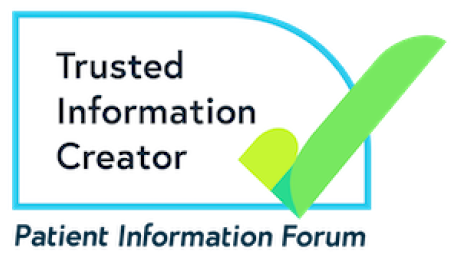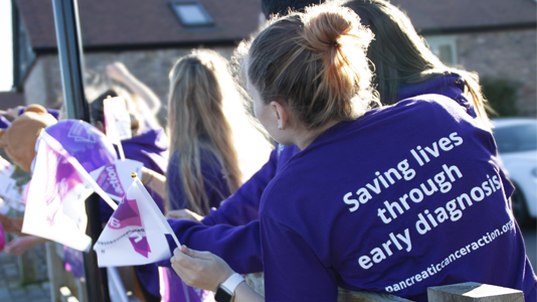Genetics and pancreatic cancer
The link between genetics and pancreatic cancer
Most cases of pancreatic cancer are not inherited, and the cause is unknown. However, some genetic conditions and family traits can give you a higher chance of getting the disease.
Genes and pancreatic cancer
Genes are segments of DNA inherited from our parents, with everyone receiving two copies of each gene—one from each parent. These small differences in our genes contribute to the unique traits seen in individuals. Genes act as a code for all bodily processes, and if they become damaged or mutated, cells can grow uncontrollably, leading to cancer. If mutated genes are passed on, children may have a higher risk of developing cancer.
A family history of pancreatic cancer or inherited genetic conditions can increase your risk, which can be discussed with a doctor. While family history is a risk factor you can't change, being aware of it allows you to manage your health. Most pancreatic cancers, however, occur without any family history, and although some gene mutations can be tested for, there is currently no way to predict all pancreatic cancers.
Frequently asked questions about the link between genetics and pancreatic cancer
-
Unfortunately, there is currently no genetic test for pancreatic cancer. In many families, the genes that might cause pancreatic cancer are unknown.
Most cases of pancreatic cancer do not run in families, but there are some rare medical syndromes which are known to increase the risk of pancreatic cancer.
-
Genes are sections of DNA inherited from our parents. Everyone has two copies of each gene, one from their father and one from their mother. Everyone is different and small differences in our genes create the differences seen between people.
Genes act as a code to every process in the body. We have hundreds of thousands of genes, each with their own function. If genes are not functional in some way (mutated) cells can grow out of control and cause cancer. If these genes are passed onto children, they have an increased chance of developing cancer.
-
A small percentage (5-7%) of pancreas cancers are caused by inherited defects in the BRCA1 OR 2 gene. Gene testing for BRCA2 mutations is available.
BRCA1 and BRCA2 are tumour suppressor genes that help regulate cell growth. Mutations in these genes can impair DNA repair, increasing the likelihood of developing certain cancers, including pancreatic cancer. Although these mutations are more commonly associated with breast and ovarian cancer, BRCA2, in particular, is linked to a higher risk of hereditary pancreatic cancer. If cancer runs in a family, discussing family history with a GP may lead to predictive gene testing for BRCA mutations, which can help assess personal cancer risk.
Predictive gene testing involves first testing an affected relative for mutations. If a mutation is found, other family members can be tested to see if they carry the same mutation. While there is no specific genetic test for pancreatic cancer, testing for BRCA mutations and other related genes can be beneficial. However, if no strong family history exists, or no mutations are found, individuals may not be eligible for testing on the NHS and would need to pursue private testing. Predictive testing has its pros and cons, including potential lifestyle adjustments or anxiety based on the results.
-
This is when pancreatic cancer runs in families, however, this is very rare, affecting between 5-10% of all cases. Most cases of pancreatic cancer occur out of the blue with no family history of the disease. Familial pancreatic cancer is when a certain gene is passed on from a parent to their child, this gene then increases the chance of developing certain cancers. Examples include;
- Families with two or more first-degree relatives (parent, sibling, offspring) with pancreatic cancer.
- Families with three or more relatives with pancreatic cancer.
- Families with an associated cancer syndrome and at least one case of pancreatic cancer. This includes families with gene mutations on BRCA1, BRCA2, PALB2 or CDKN2A (p16) and one or more first-degree relatives with pancreatic cancer, Familial Atypical Multiple Mole Melanoma (FAMMM) syndrome, Hereditary Non-Polyposis Colorectal Cancer (HNPCC) (also called Lynch syndrome) and Peutz-Jeghers syndrome. See below for more information. (links to below information on each)
- Hereditary pancreatitis and a PRSS1 gene mutation
-
Pancreatitis itself is fairly common however, hereditary pancreatitis is quite rare. It is a genetic condition usually involving the development of several episodes of severe chronic pancreatitis which starts at an early age (usually between the ages of 5 and 26 but can occur at any time). Patients with recurring episodes of pancreatitis are recognised as being at an increased risk of developing pancreatic cancer.
-
Pancreatic cancer runs in some families. People with first degree relatives (mother, father, brother, sister) diagnosed with pancreatic cancer have an increased chance of pancreatic cancer themselves. The greater the number of first degree relatives with pancreatic cancer the greater this risk is.
Family history is a strong predictor of pancreatic cancer risk because it is suggestive of the presence of a genetic link to pancreatic cancer, although lifestyle factors also play a role, such as smoking and obesity.
If you have a greater chance of developing pancreatic cancer because of your family history, you may want to become familiar with the symptoms of the disease so that, if you suffer any symptoms, you can go to your GP sooner to catch the disease earlier.
-
The syndromes outlined below are rare conditions, if you have any of these it is very likely you will already know about it. Unless you have the gene mutations (below) and/or have a family member with other types of cancer, your genetic and inherited risk of having pancreatic cancer is very small.
Hereditary Colon Cancer
The HNPCC (Hereditary Non-polyposis Colorectal Cancer) syndrome is an inherited predisposition to develop colon cancer, pancreatic cancer, endometrial (uterine) cancer, stomach cancer and ovarian cancer. Gene testing for HNPCC is available.
Familial Melanoma
The FAMMM (Familial Atypical Multiple Mole Melanoma) syndrome is a rare hereditary syndrome which increases melanoma risk (an aggressive form of skin cancer) in some families. These patients also have an increased chance of developing pancreatic cancer.
Peutz-Jeghers syndrome
Peutz-Jeghers Syndrome (PJS) is a rare genetic condition that increases the risk of several cancers, including pancreatic cancer. It is caused by a mutation in the STK11 gene and is inherited in an autosomal dominant manner, meaning if one parent has PJS, there is a 50% chance their child will inherit the condition. PJS often presents in childhood with non-cancerous polyps in the digestive tract and distinctive dark spots on the skin, typically around the mouth, lips, and cheeks. Symptoms can include abdominal pain, diarrhoea, constipation, and rectal bleeding.
Though PJS cannot be prevented, regular screening is vital to manage the condition and catch any potential complications early. Polyps are usually removed through endoscopic procedures, and surgery may be needed in severe cases, such as when the intestine folds into itself (intussusception). Those with PJS should undergo regular cancer surveillance, as this syndrome significantly raises the risk of pancreatic and other cancers. Early detection and treatment can improve outcomes, so it’s essential to discuss any concerns with a healthcare professional.
Ataxia telangiectasia
Ataxia telangiectasia is a primary immunodeficiency disease which affects a number of different organs in the body. An immunodeficiency disease is one that causes the immune system to break down, making the body susceptible to diseases. It is a rare, recessive genetic disorder of childhood that occurs in 1 out of 40,000 – 100,000 people worldwide. Cancer risk is increased in people with the condition including pancreatic and breast cancers.
What is Pancreatic cancer and how is it diagnosed?
This booklet for patients and carers describes pancreatic cancer, its causes and symptoms. It gives detailed information on the diagnostic tests used and the stages of pancreatic cancer. It includes a section on what to ask your doctor, where to go for further information and a glossary to explain many of the terms used.
Read more
The role of genetics in pancreatic cancer
This booklet offers an introduction to genes, genetic testing, and genetic conditions that heighten the risk of pancreatic cancer.
Read more
The information provided in this site, or through links to other websites, is not a substitute for medical or professional care and should not be relied upon as such. Read our disclaimer.
Sources and references for this information product will be supplied on request. Please contact us quoting the Information Product number below:

- Information Product No: TBC
- Published: 21 Apr 2022
- Last updated: 26 Sep 2022
- Next Review Due: 26 Sep 2025
